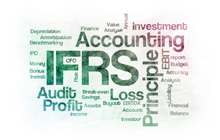Canadian tax revolt falls short of IFRS rebellion

Columnist Al Rosen believes Canadians are missing a bigger threat to their savings than taxes
TORONTO, Nov. 29, 2017 – This year’s tax changes revolt forced the federal government into withdrawing some of its proposals and amending other intended legislation. Immediate cash losses to taxpayers were readily perceived and evoked a strong objection that caused the federal Finance Department to back down.
Contrast the tax revolt to how Canadians have failed to grasp a far more costly long-term, yet government-supported cash grab. Each week, your pension and retirement dreams are quietly being eroded by schemes that steal from your future standard of living. Yet these significant cash thefts from your future lifestyle receive barely a yawn from citizens and lawmakers. Why?
Many companies that have adopted International Financial Reporting Standards (IFRS) should be watched carefully for indications that they have grossly enhanced income/profit and cash flow from recurring business operations. IFRS is simply too loose and conceptually ill-founded for users such as investors and creditors, who desire periodic tabulations of actual, not pretended, operating cash flows. Stock prices under IFRS are being distorted.
IFRS is simply out-of-phase with how business functions. It is based upon reporting extensive non-cash management-based “valuations,” which hide the determination of actual cash-based profits. Like bond pricing, the timing of receipt of cash, such as interest, is vital in business asset valuation. Yet IFRS can be described as an extreme of accrual accounting, where cash receipt could be months or even years later than when it has been reported as an income figure.
In my opinion, too many analysts and investors have been conned by non-cash transactions being labelled or treated as cash-based. For example, a collection of accrued receivables (offset by recorded revenue) that are ultimately rarely being collected cannot be repeatedly reported as a current cash receipt for investment purposes. The very fact that a long-term receivable category exists in a company’s balance sheet calls for attention so as to verify its legitimacy, especially for finance companies. Unrecognized bad debt losses cannot continue to be reported as being legitimate assets, year after year.
Waiting for IFRS to correct itself is futile. Too much greed enters the picture. The concept of value or worth represented by cash receipts such as dividends, suitably discounted to the present time, has been well founded for centuries in business. IFRS ignores such basic business concepts and practices.
To illustrate, it is vital to understand how IFRS’ “cash flow from operations” can be and is being manipulated. Stock prices are often heavily based on “cash flow from operations.” The main categories of trickery, designed to inflate “cash flow,” are:
- Manipulators often construct their calculation of “cash flow from operations” using faked income statements that are loaded with non-cash upward “value” adjustments, premature revenue recognition and capitalized-to-the-balance-sheet expenses. In short, trickery can be falsely carried over from an exaggerated Income statement to the Cash Flow statement.
- The Cash Flow statement, having its three main categories (operations, financing, and investing transaction), is wide open to movements out of one category into another. As a consequence, relocated investing transactions such as sales of long-term assets can inappropriately bloat upwards cash flow from “operations,” and certain expenses such as interest can be labelled as “financing” when they belong as reductions of “cash from operations.”
- Balance Sheet games. Current asset and liability increases or decreases at a period-end can be manipulated easily. A delayed payment of trade payables, for instance, has the effect of falsely increasing “cash from operations.” Our recent book, Easy Prey Investors elaborates on more and similar such trickery. Many of these cover-ups are frequently utilized within IFRS.
- Miscellaneous and also currently popular. What would often be regarded as a cash expense can often be turned into a non-cash item by treating the cash outlay as an “investment.” The “investment” could be called a “non-current” item and quickly be amortized over three years or so. Amortization is non-cash and thereby falsely increases “cash from operations” by the expense not having been called such. Rental operations (such as for telcos) thus can include cash rental revenue within income but have little or no cash cost of sales within “cash from operations.”
Strangely, proponents of IFRS claim that notes to financial statements cure much of the above. Not so. For instance, it is the dollars of calculated or quantified taxable income that attract the dollars of taxation expenses. Not notes. Tax authorities cannot accept as payment 40 per cent or so of a disclosure note. Shareholders seek dividends in cash; not some non-negotiable sentence or two from a note.
This year’s taxpayer revolt forced the federal government to back down from its tax plans. Yet we ignore substantial evidence that IFRS was an unsuitable choice for Canada, and the risks it poses to Canadians, such as compounding investor losses.
Dr. Al Rosen, FCA, FCMA, FCPA, CFE, CIP and Mark Rosen, MBA, CFA, CFE, provide independent, forensic accounting investment research. They are the co-authors of Easy Prey Investors: Why Broken Safety Nets Threaten Your Wealth. Learn more at Accountability Research Corporation and Rosen & Associates Limited.
The views and opinions expressed by contributing writers to Canadian Accountant are their own. Canadian Accountant and its parent company bear no responsibility for the accuracy and opinions of contributing writers.










(0) Comments